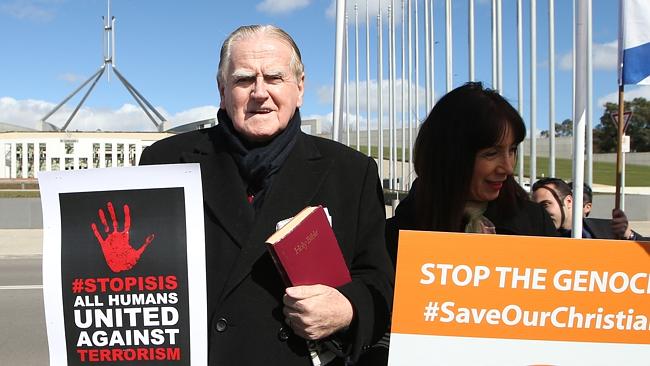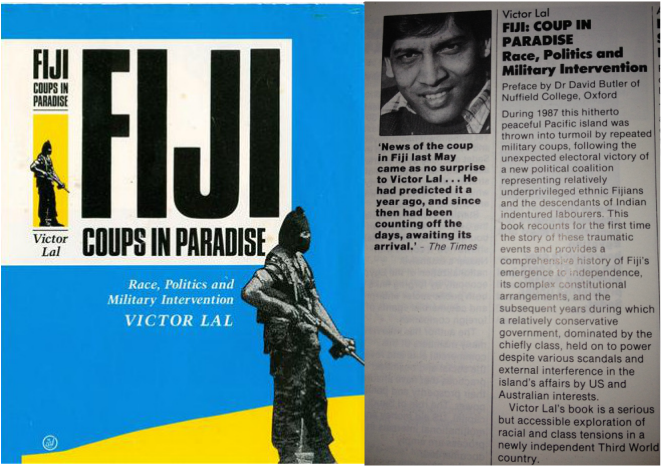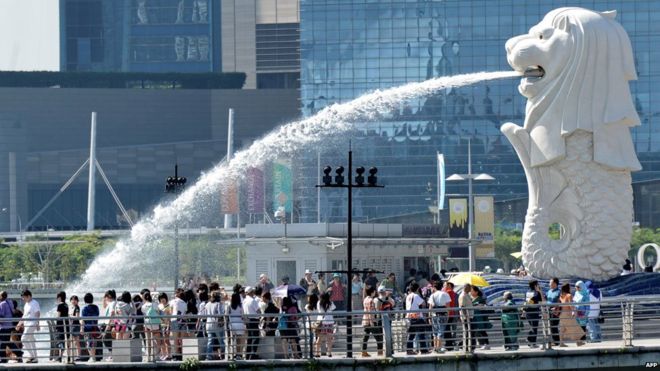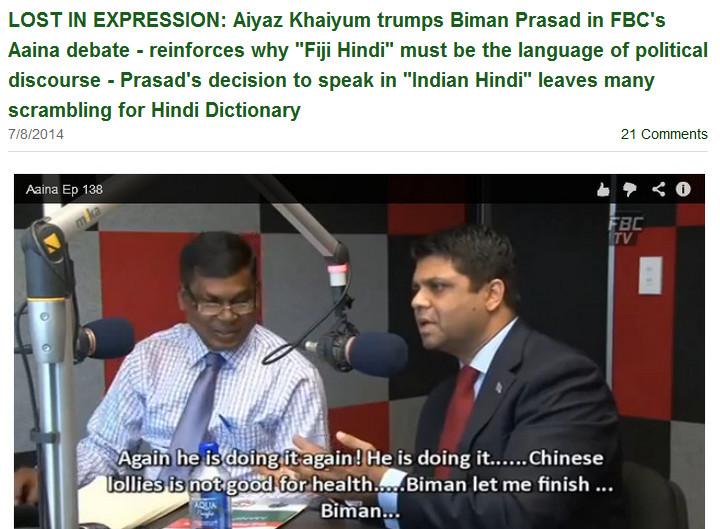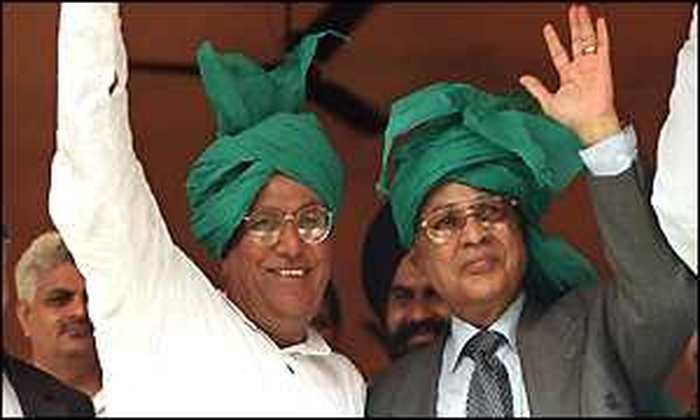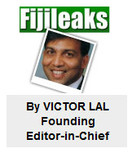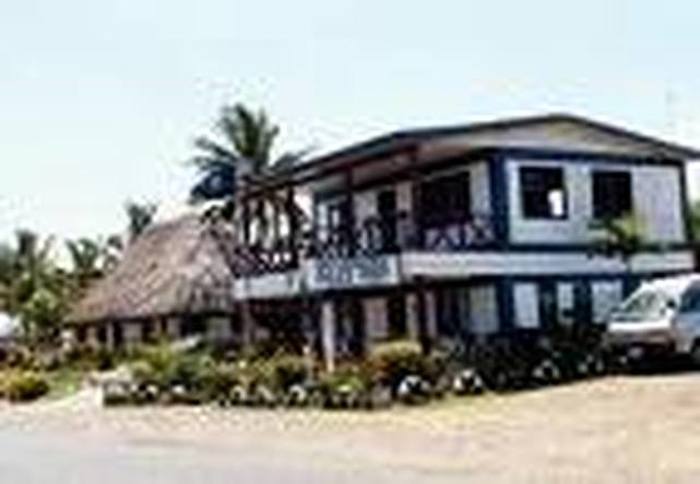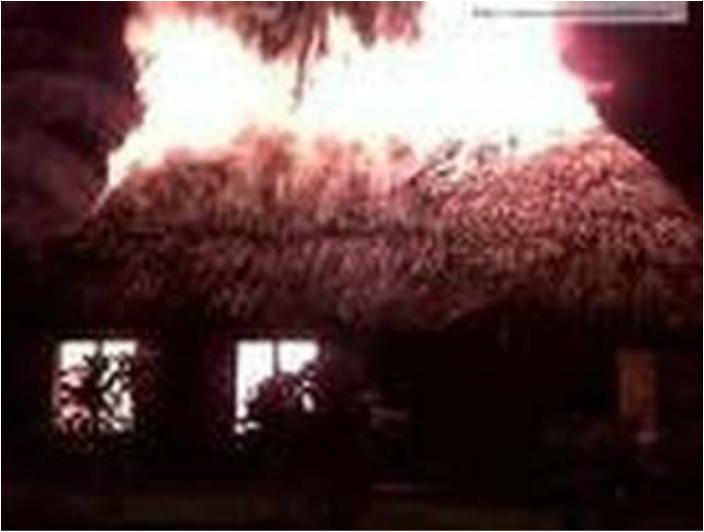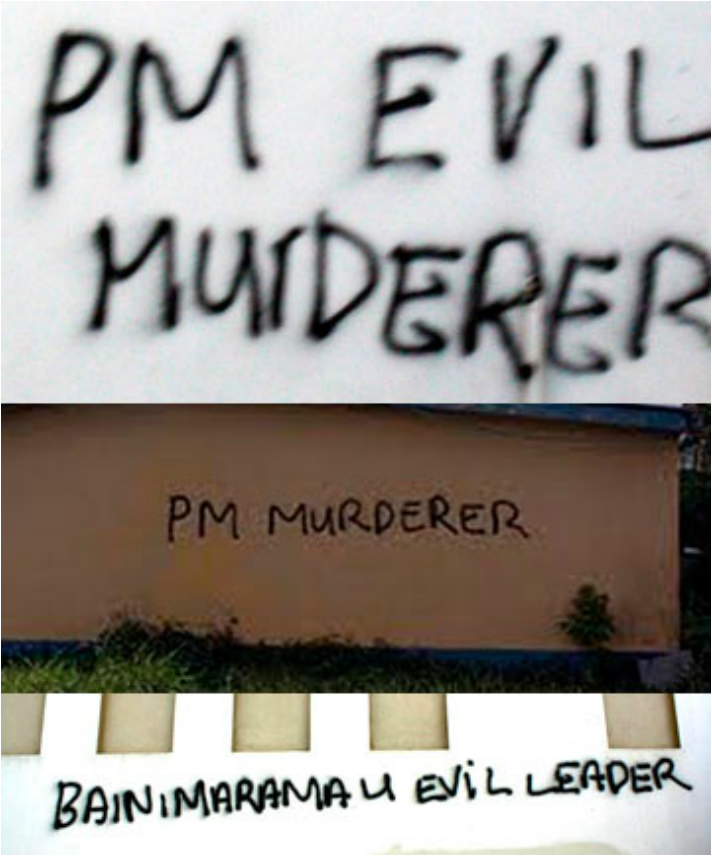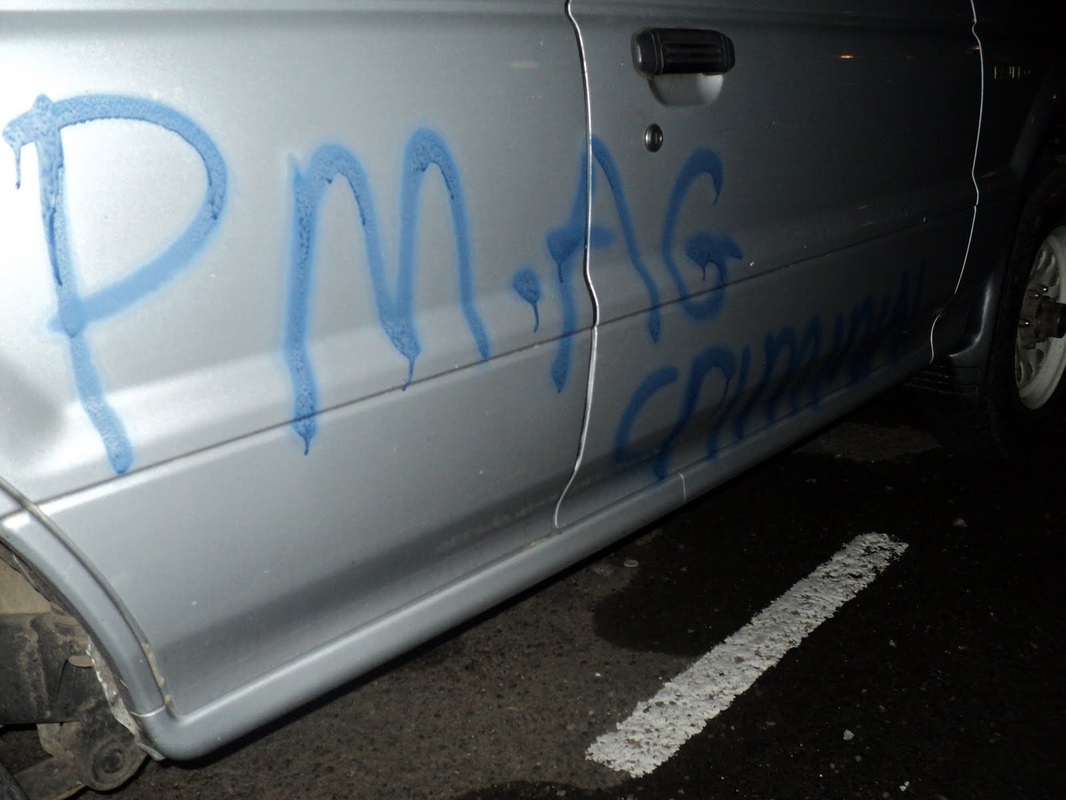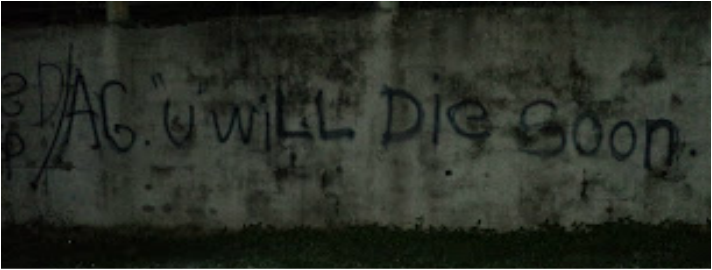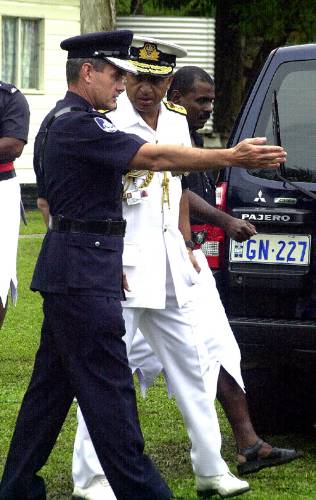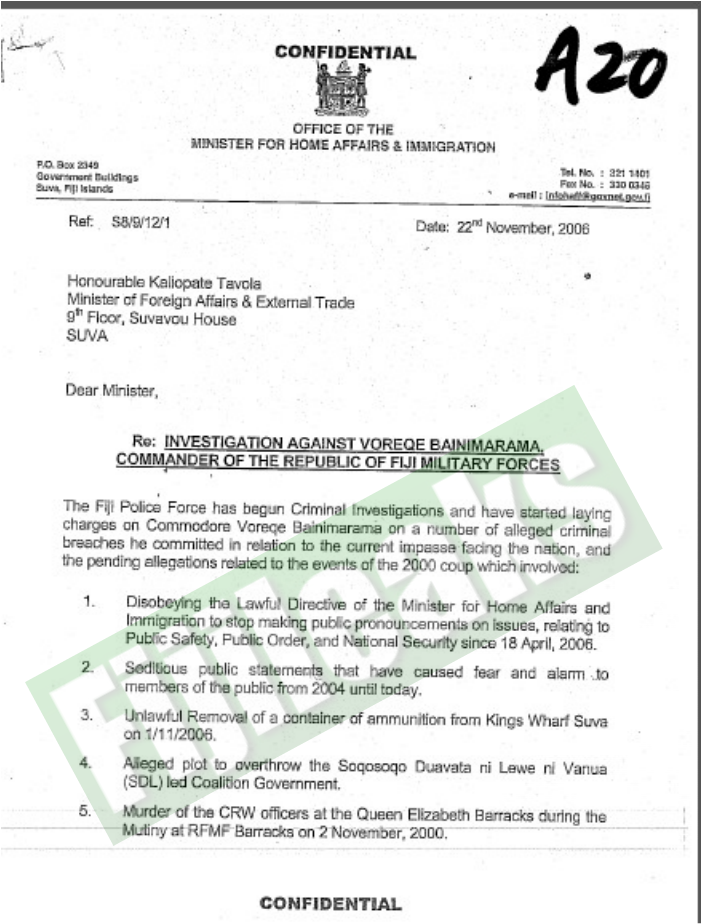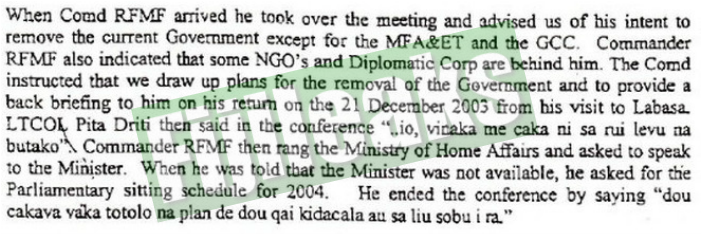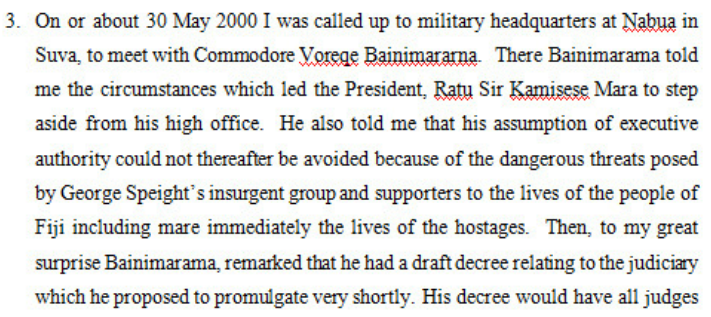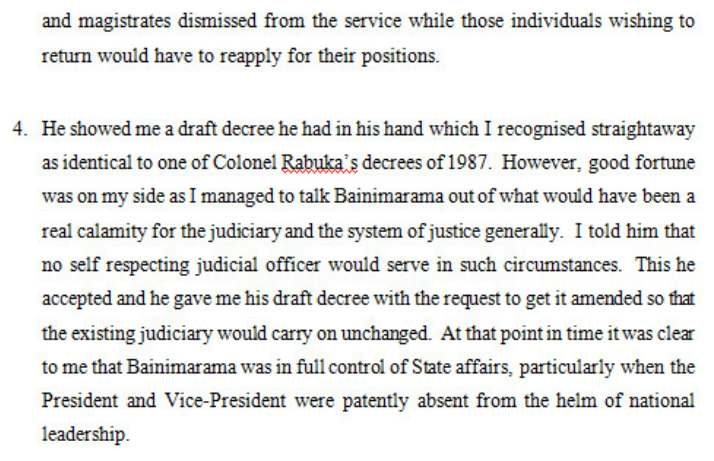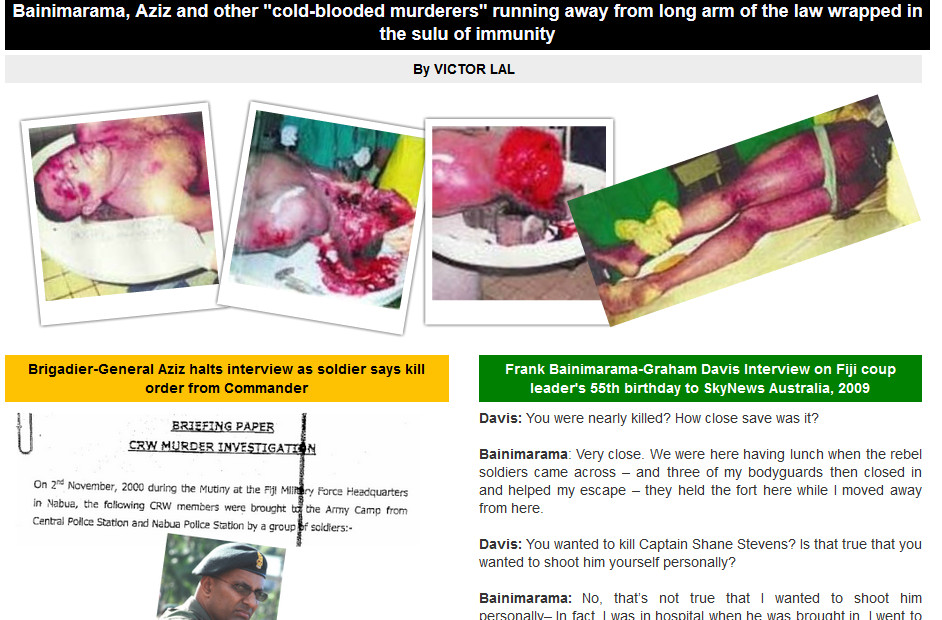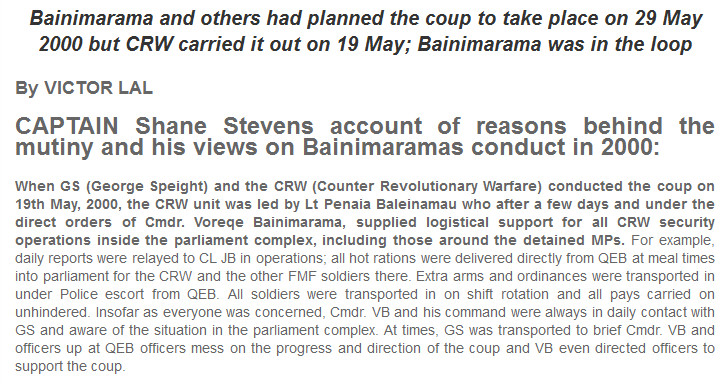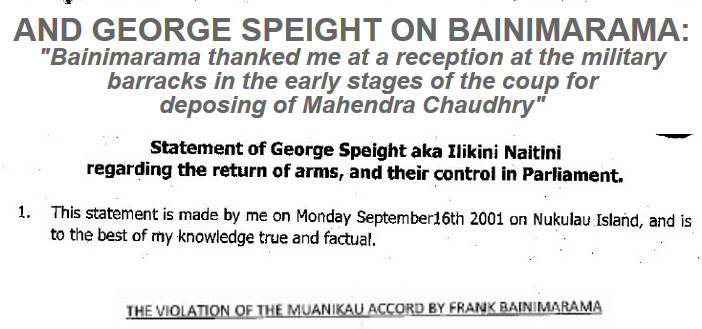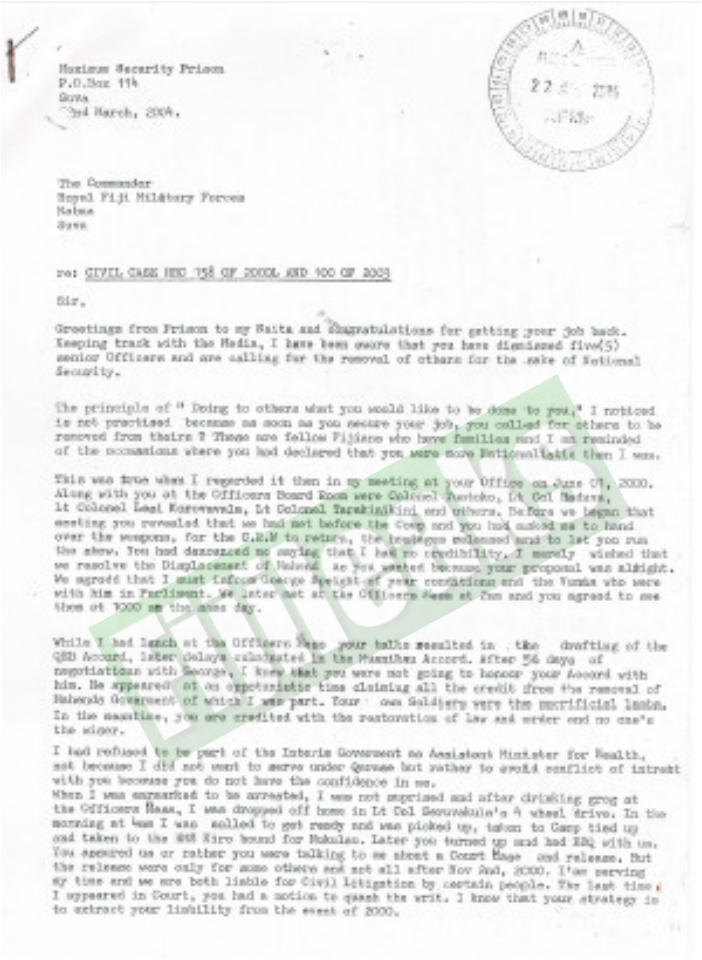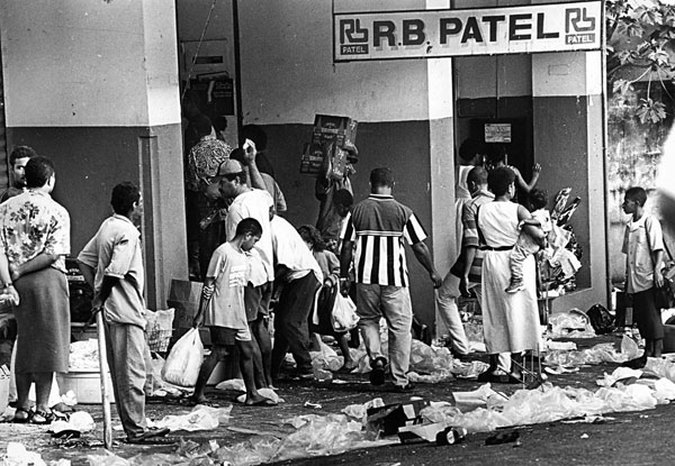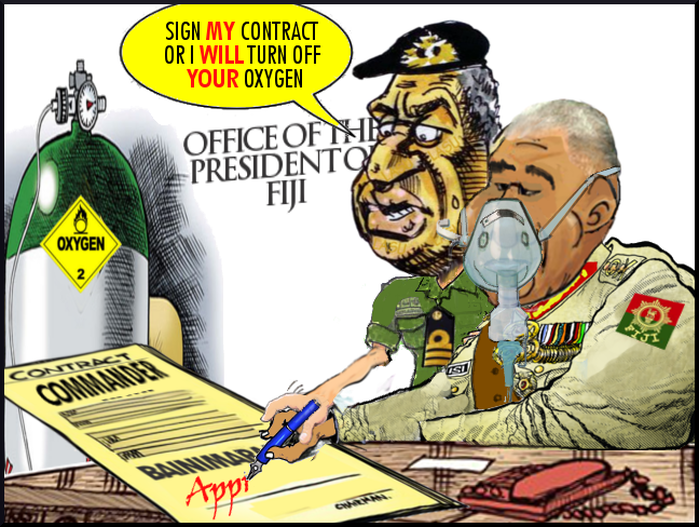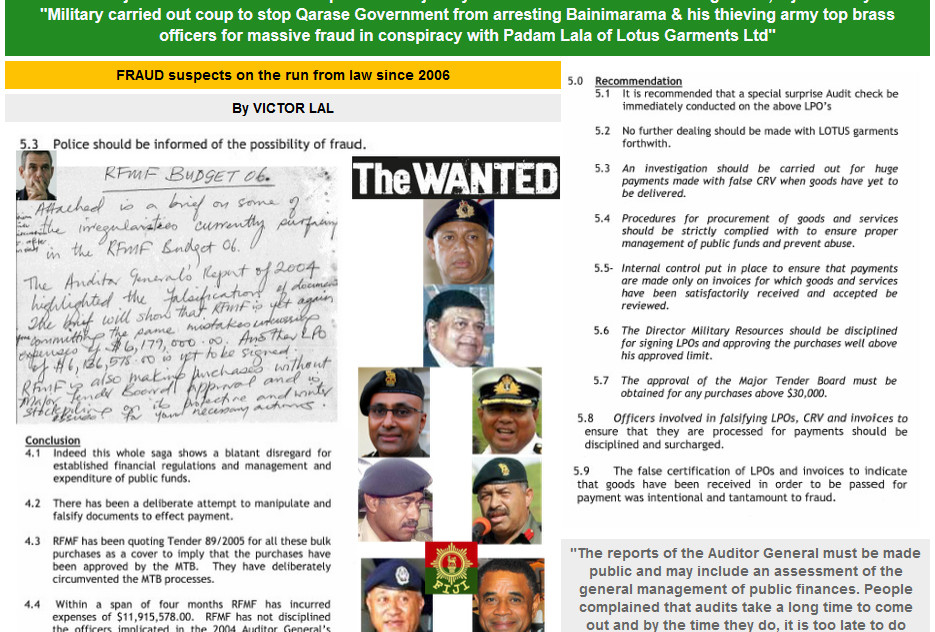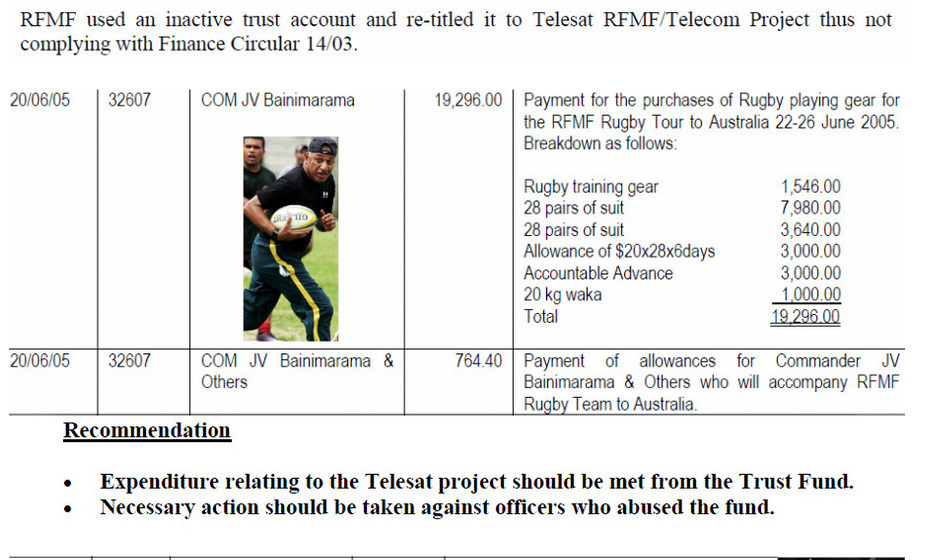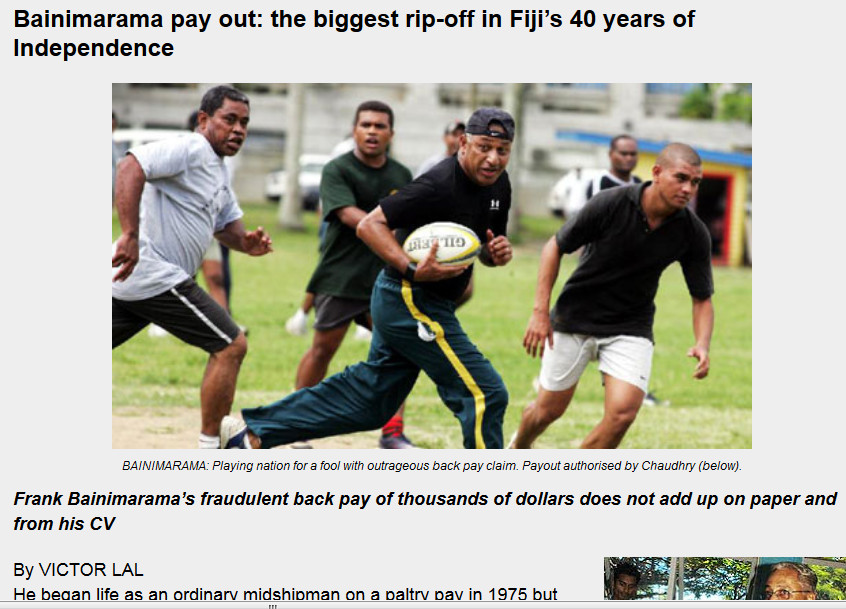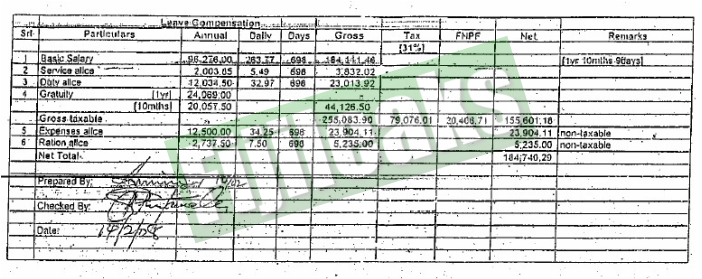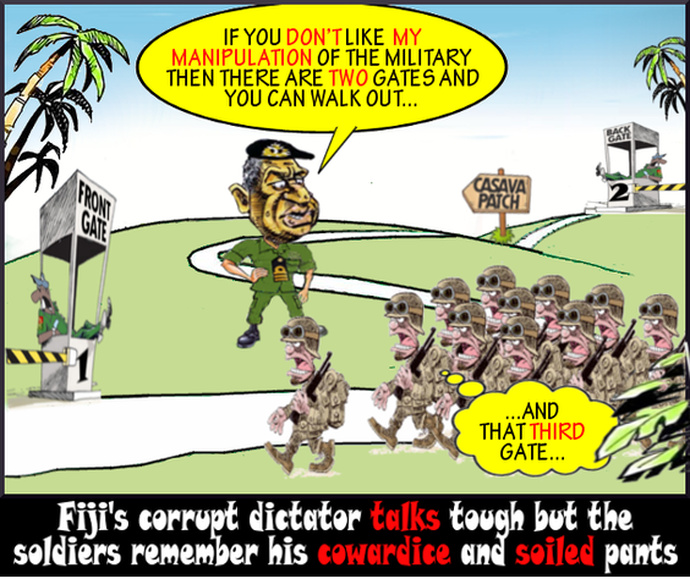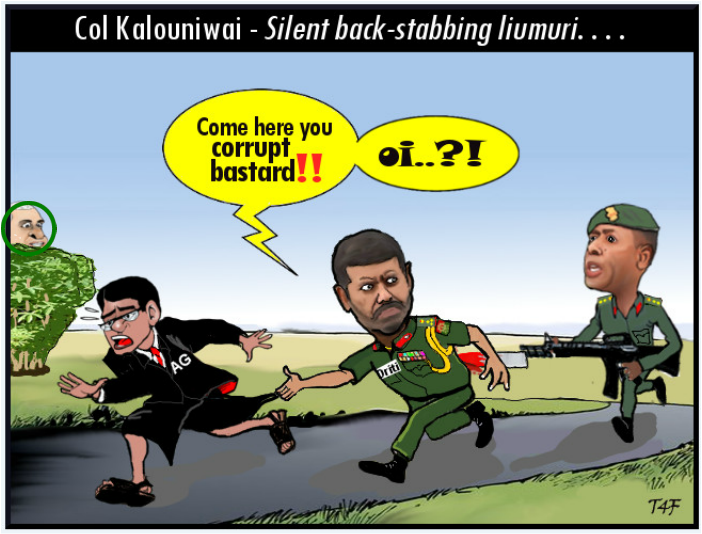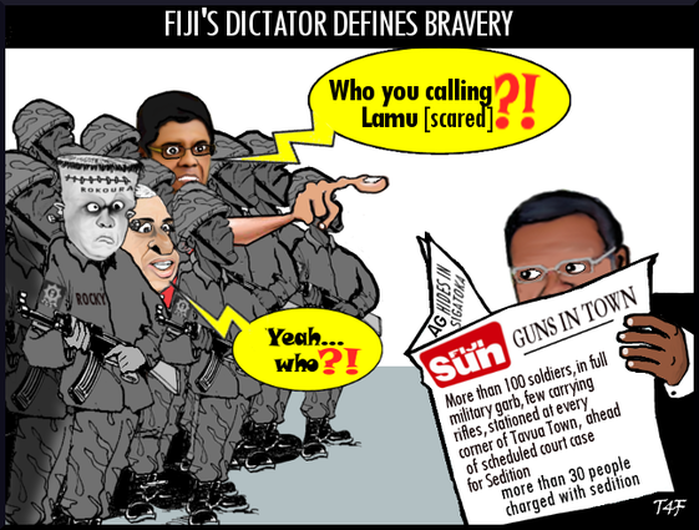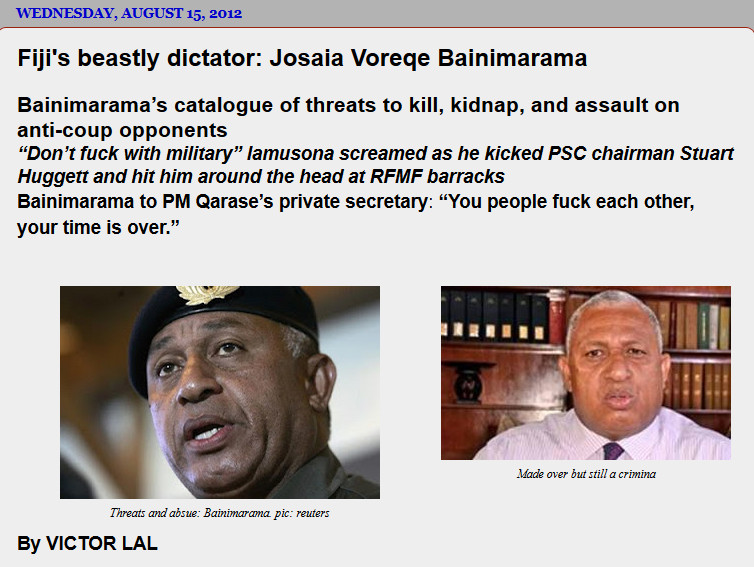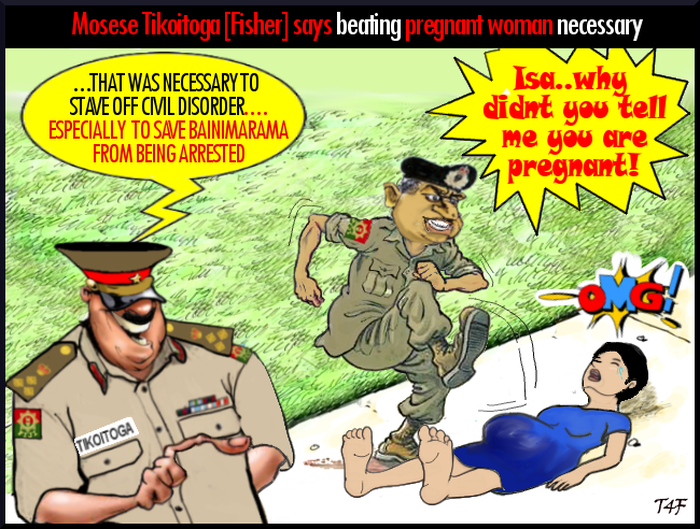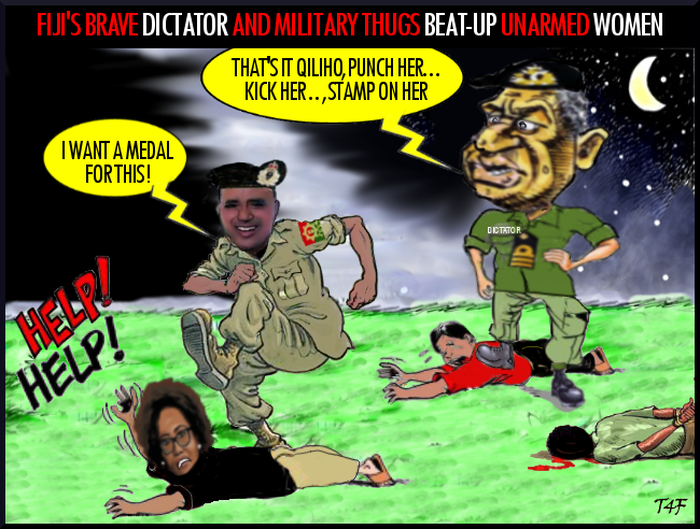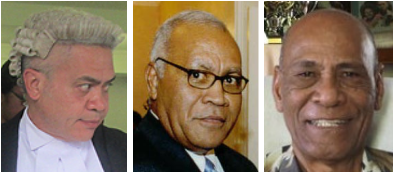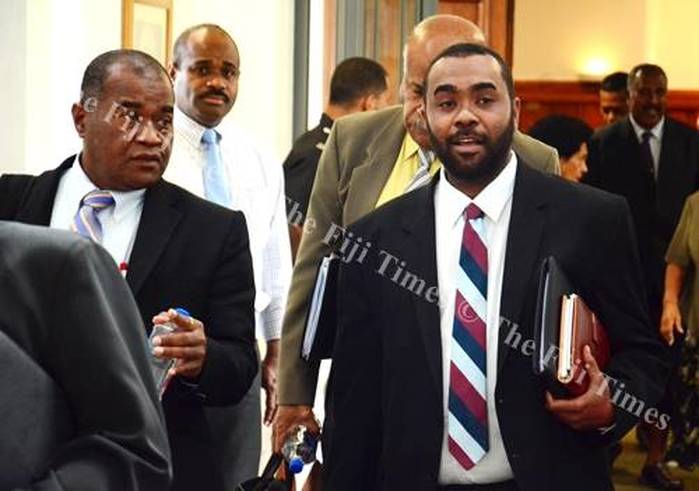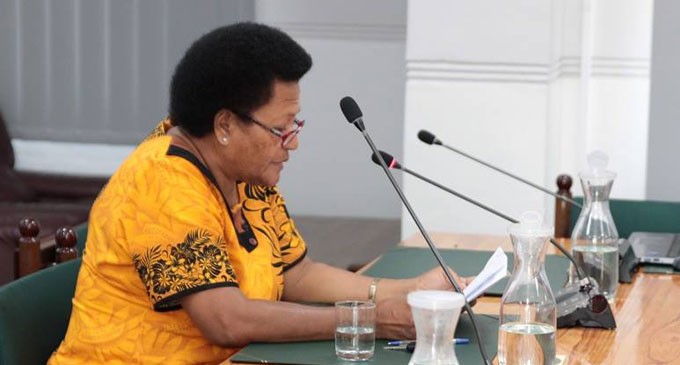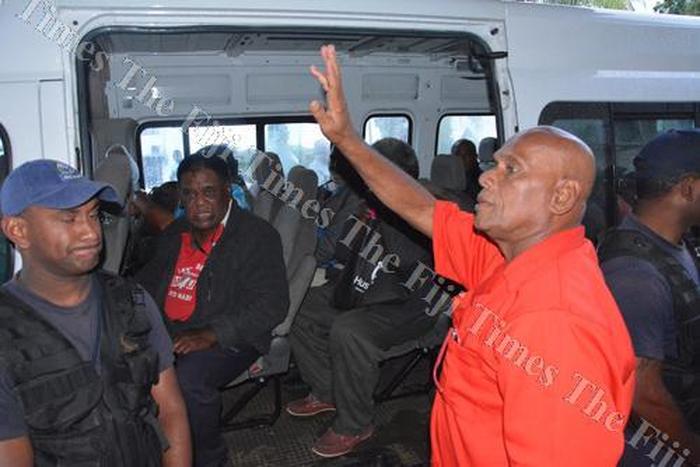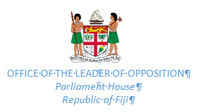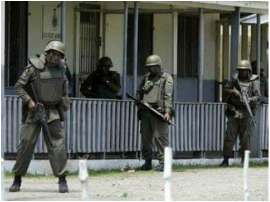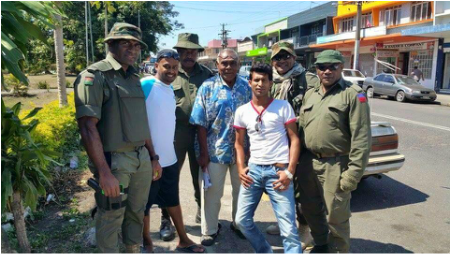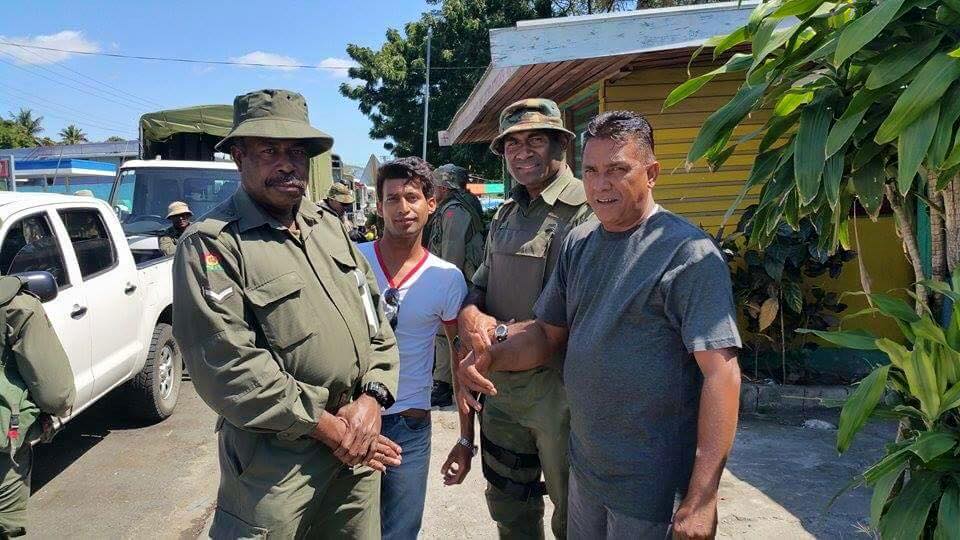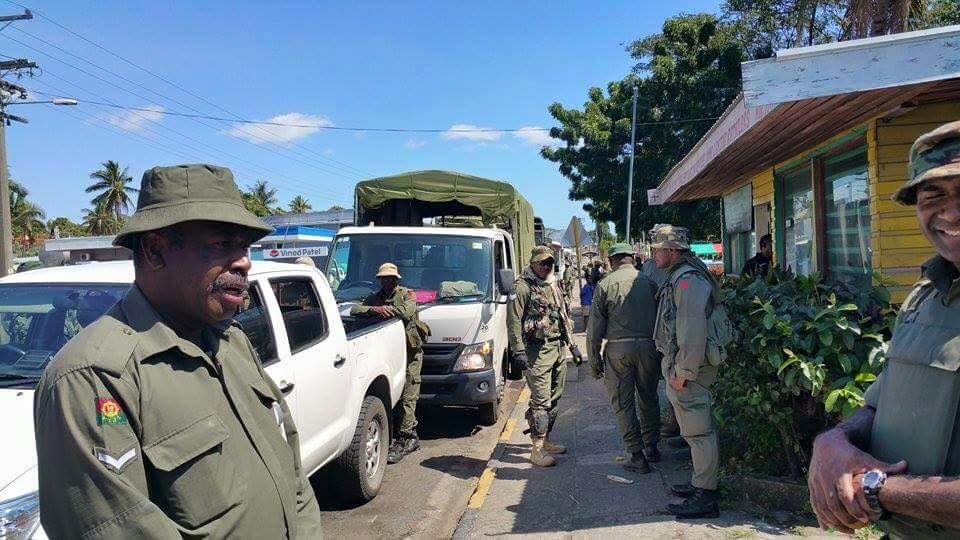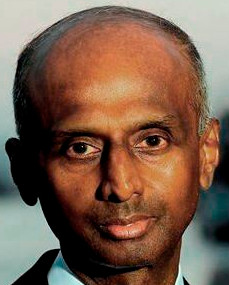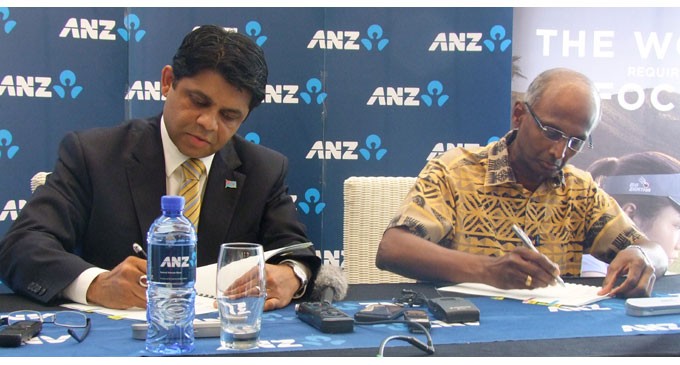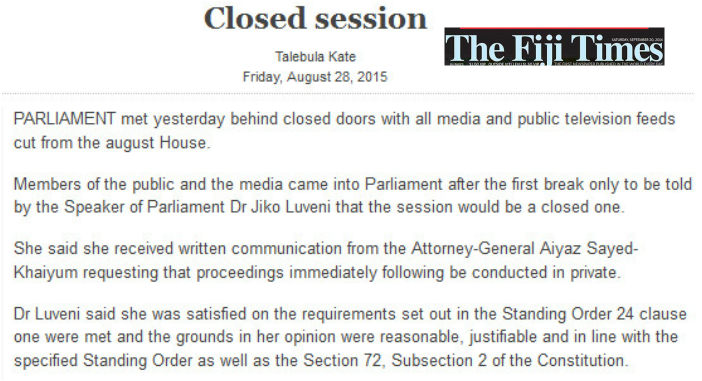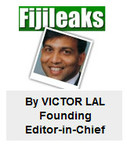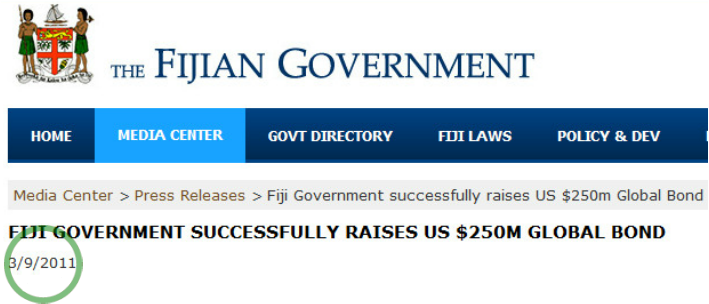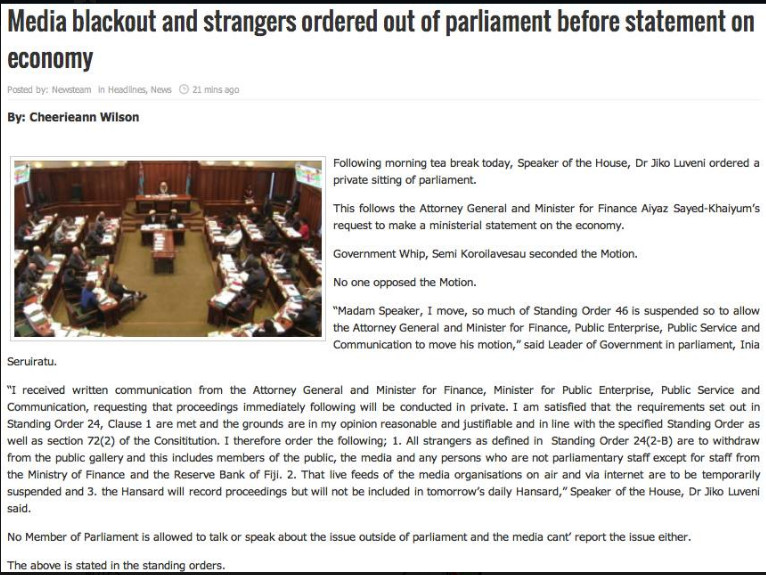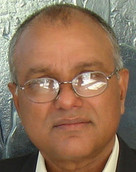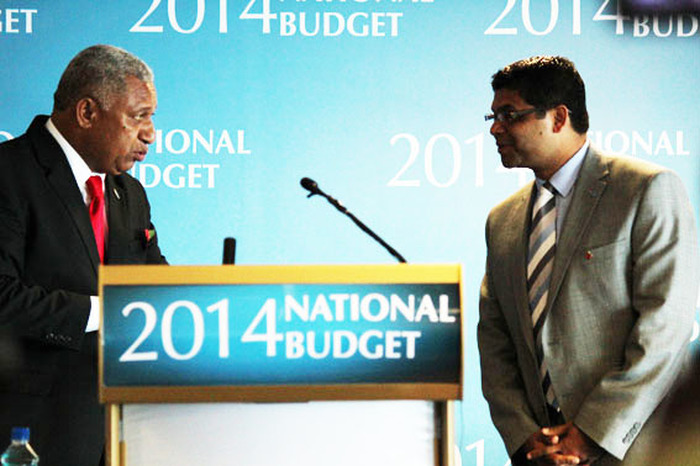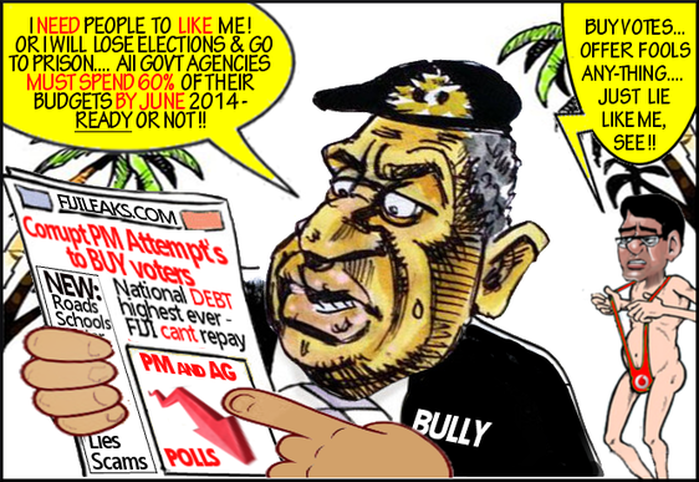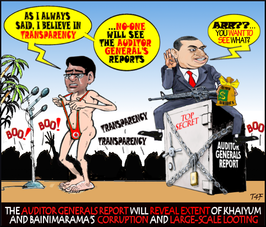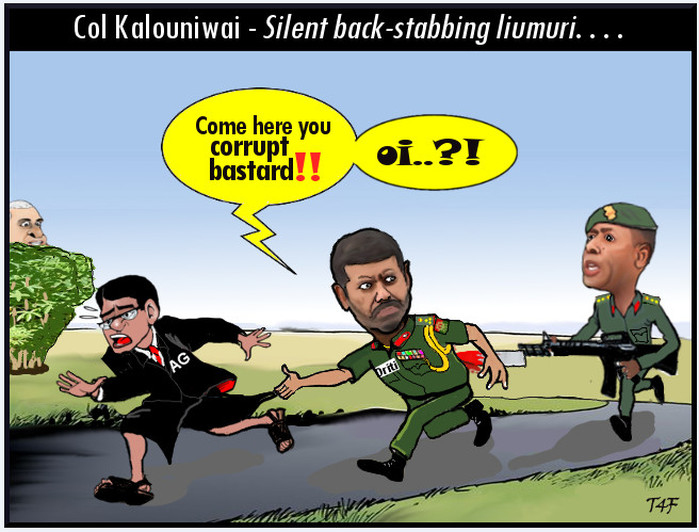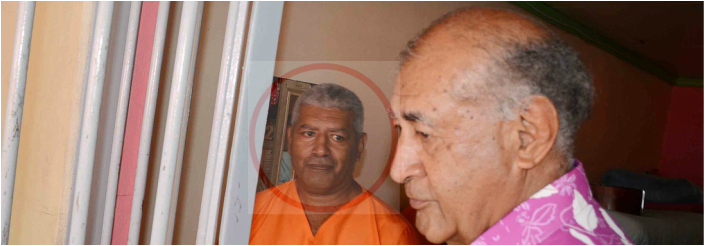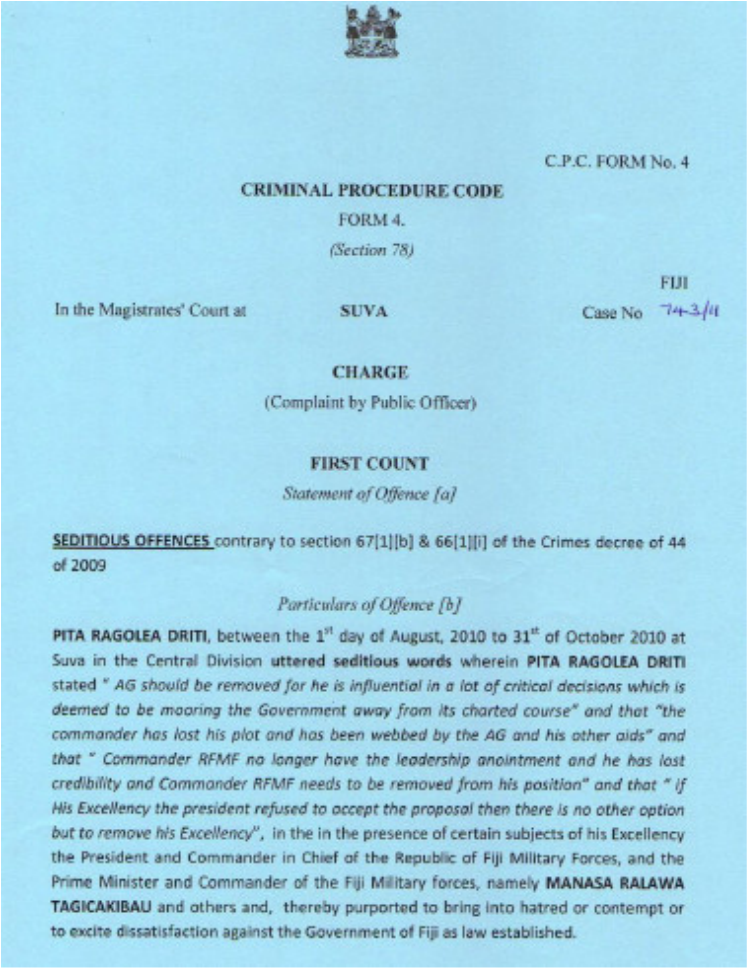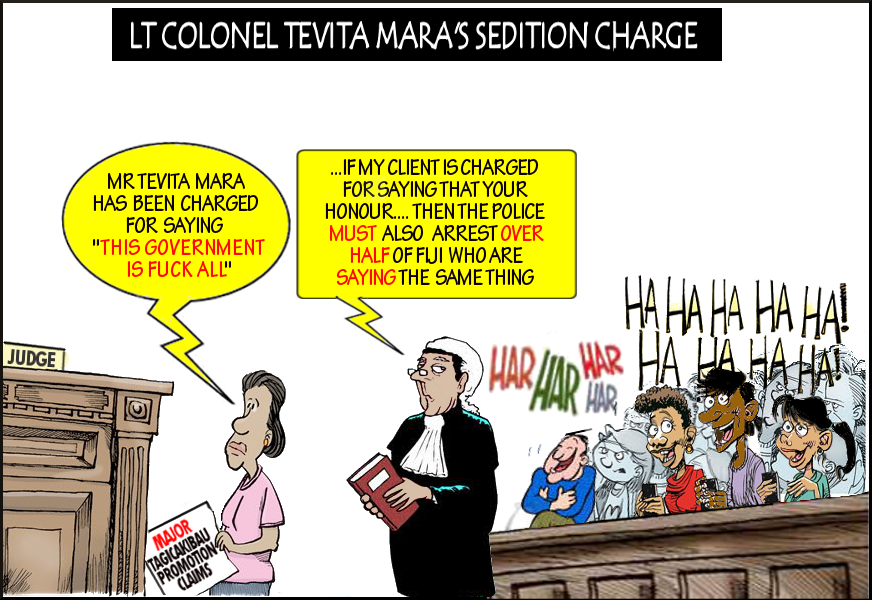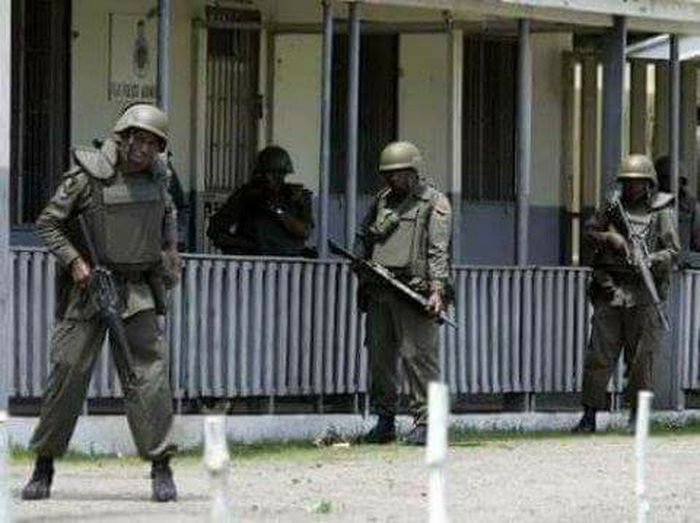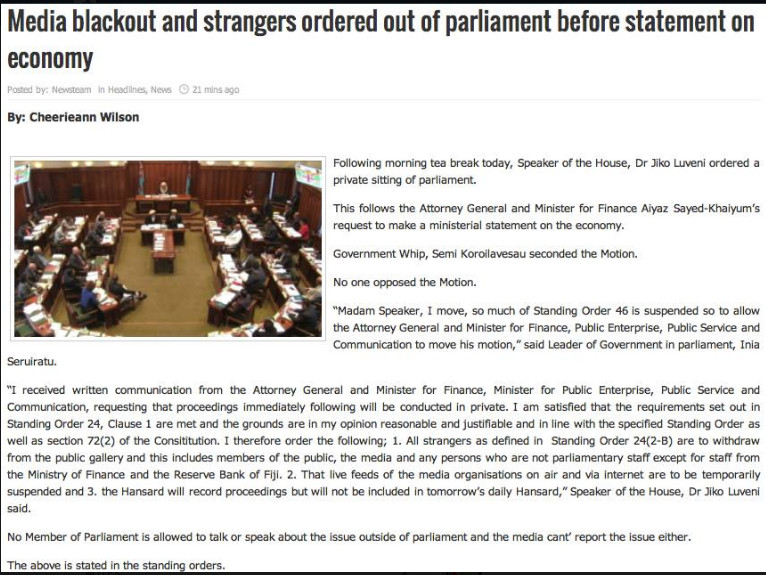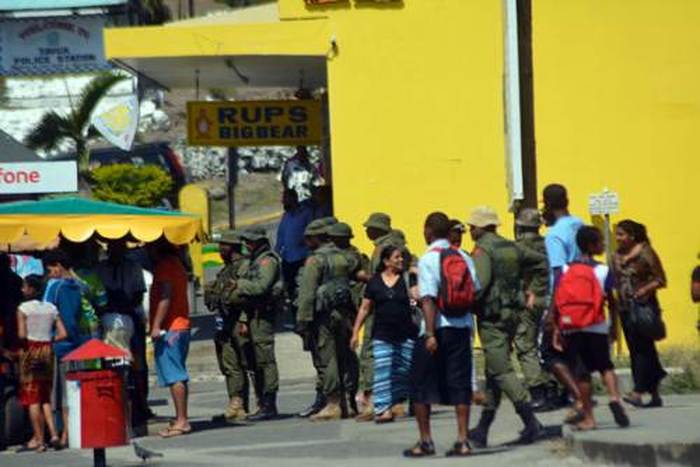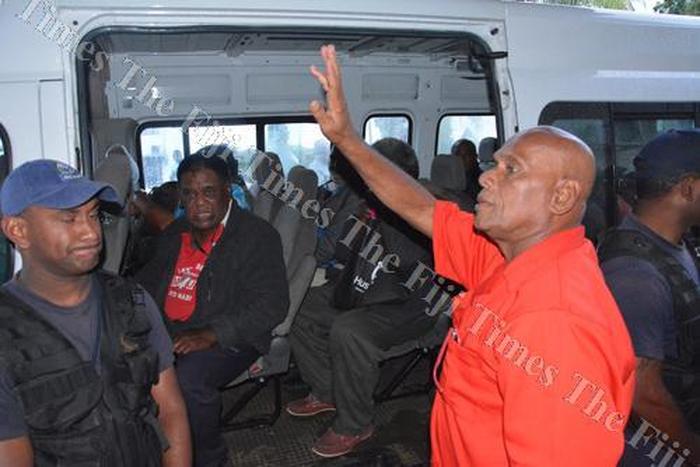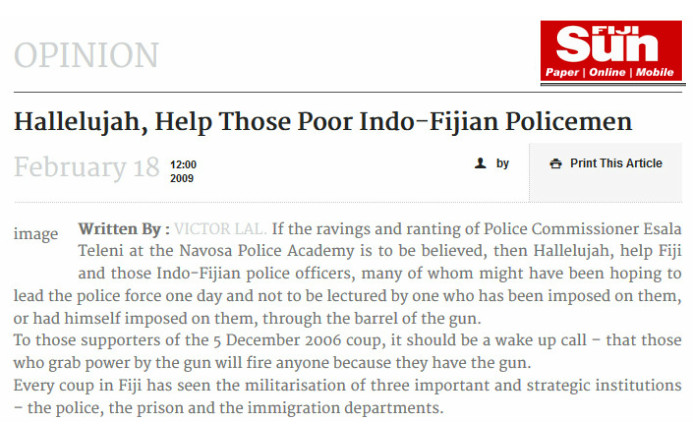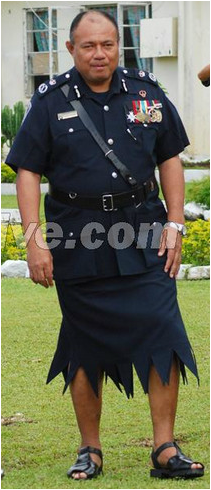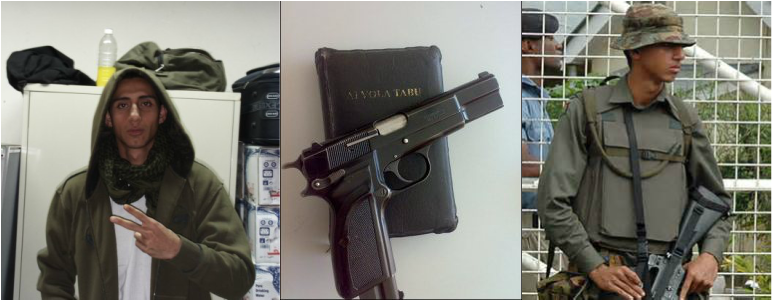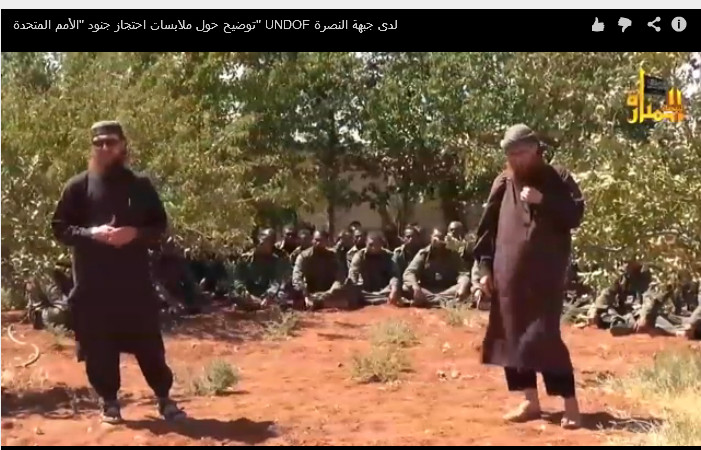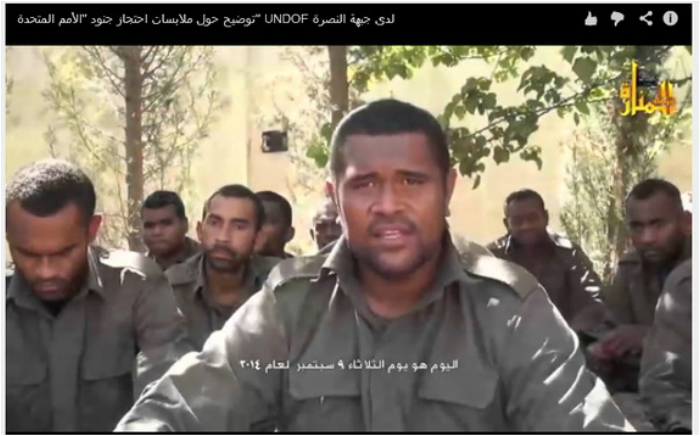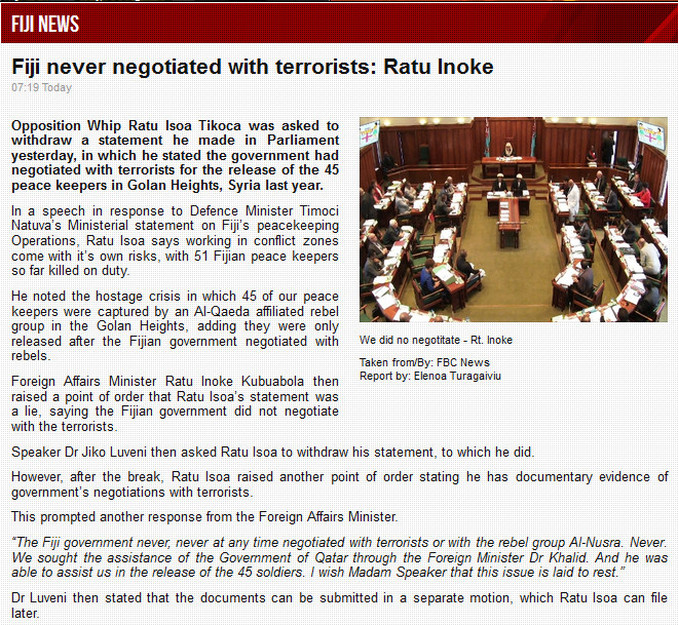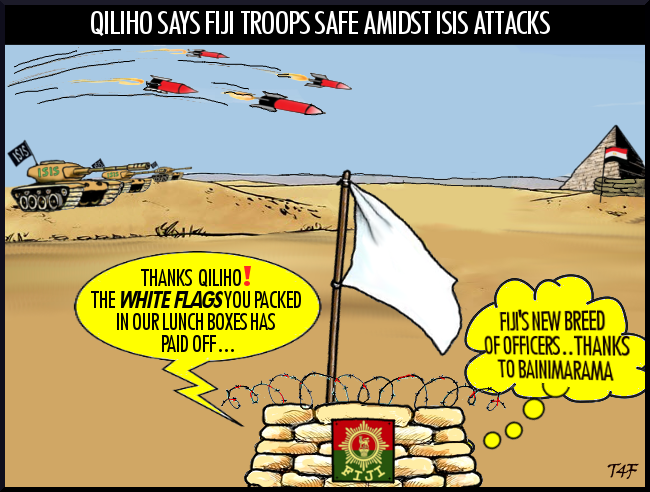Fiji PM ‘distracts’ with overseas plotter threat
A threat by Fiji's prime minister to “track down” and jail Fijians living in Australia and elsewhere who support a Christian secessionist movement has been dismissed as a diversionary tactic from domestic problems.
More than 60 people allegedly linked to anti-Muslim separatists have been detained in Fiji, accused of plotting to create a breakaway state on the western part of the main island of Viti Levu.
Their supporters in Australia have vowed to fight on and are raising a legal defence fund.
“I’m not frightened or scared at all,” said Oni Kirwin, who describes herself as attorney-general of the Ra and Nadroga Christian state.
“There is a takeover in Fiji and it is not a good one. We’re concerned by Muslims. Their influence is very, very high.”
“There is a takeover in Fiji and it is not a good one. We’re concerned by Muslims. Their influence is very, very high.”
Ms Kirwin blames the 2013 secular constitution introduced by prime minister Voreqe Bainimarama, guaranteeing equality for all Fijians.
She points to Muslims holding high office in the Bainimarama government, including attorney-general Aiyaz Sayed-Khaiyum.
About seven per cent of Fiji’s population is Muslim.
The Fiji-born, Australian-based Ms Kirwin has now reportedly been banned from returning to Fiji.
Some of those detained in Fiji for allegedly plotting to create a breakaway Christian state are also accused of being involved in 'military-style' training.
A week-long search by hundreds of Fijian police and soldiers has not found any firearms.
Prime minister Bainimarama on Friday issued a warning to Fijians living overseas who support the Christian state movement.
“If you encourage sedition you are committing a serious offences. If you urge violence in Fiji, you are committing a serious offence. The hand of the law is very long and authorities will not rest until you are brought to justice,” he said.
“People behind this international don’t believe in democracy or listen to the will of the people. They want to impose their will on everyone else.
"They are enemies of the state and enemies of the Fijian people. They are enemies of investment and they are enemies of a modern Fiji. They are enemies of a prosperous Fiji and we are going to track them down and bring them to justice."
Critics of the Bainimarama government say his response is an attack on freedom of speech.
"I think, as some critics suggest, it's a diversionary thing from criticism of the government and diversion from the economy,” said professor Brij Lal, Indo-Fijian historian at the Australian National University.
“He (Voreqe Bainimarama) has in his sights people who are critics of the government. He equates criticism of the government as an attack on democracy.”
Mr Lal is also baffled by the separatists intentions.
"You have crazy people all over the world, it's simply ridiculous. Western Fiji is fully integrated into the economy. This is a nonsensical."
Supporters of the Christian state have allies in Australia.
They were blessed by the Reverend Fred Nile during a meeting with a group led by Ms Kirwin in the New South Wales upper house of parliament in April.
“I had a request for a deputation to meet me, tell me what was happening in Fiji and they showed me the flags they were adopting,” Mr Nile said.
"It was all news to me. Obviously I'm pleased to be helping promoting the Christian faith." Source: http://www.sbs.com.au/news/article/2015/08/31/fiji-pm-distracts-overseas-plotter-threat
More than 60 people allegedly linked to anti-Muslim separatists have been detained in Fiji, accused of plotting to create a breakaway state on the western part of the main island of Viti Levu.
Their supporters in Australia have vowed to fight on and are raising a legal defence fund.
“I’m not frightened or scared at all,” said Oni Kirwin, who describes herself as attorney-general of the Ra and Nadroga Christian state.
“There is a takeover in Fiji and it is not a good one. We’re concerned by Muslims. Their influence is very, very high.”
“There is a takeover in Fiji and it is not a good one. We’re concerned by Muslims. Their influence is very, very high.”
Ms Kirwin blames the 2013 secular constitution introduced by prime minister Voreqe Bainimarama, guaranteeing equality for all Fijians.
She points to Muslims holding high office in the Bainimarama government, including attorney-general Aiyaz Sayed-Khaiyum.
About seven per cent of Fiji’s population is Muslim.
The Fiji-born, Australian-based Ms Kirwin has now reportedly been banned from returning to Fiji.
Some of those detained in Fiji for allegedly plotting to create a breakaway Christian state are also accused of being involved in 'military-style' training.
A week-long search by hundreds of Fijian police and soldiers has not found any firearms.
Prime minister Bainimarama on Friday issued a warning to Fijians living overseas who support the Christian state movement.
“If you encourage sedition you are committing a serious offences. If you urge violence in Fiji, you are committing a serious offence. The hand of the law is very long and authorities will not rest until you are brought to justice,” he said.
“People behind this international don’t believe in democracy or listen to the will of the people. They want to impose their will on everyone else.
"They are enemies of the state and enemies of the Fijian people. They are enemies of investment and they are enemies of a modern Fiji. They are enemies of a prosperous Fiji and we are going to track them down and bring them to justice."
Critics of the Bainimarama government say his response is an attack on freedom of speech.
"I think, as some critics suggest, it's a diversionary thing from criticism of the government and diversion from the economy,” said professor Brij Lal, Indo-Fijian historian at the Australian National University.
“He (Voreqe Bainimarama) has in his sights people who are critics of the government. He equates criticism of the government as an attack on democracy.”
Mr Lal is also baffled by the separatists intentions.
"You have crazy people all over the world, it's simply ridiculous. Western Fiji is fully integrated into the economy. This is a nonsensical."
Supporters of the Christian state have allies in Australia.
They were blessed by the Reverend Fred Nile during a meeting with a group led by Ms Kirwin in the New South Wales upper house of parliament in April.
“I had a request for a deputation to meet me, tell me what was happening in Fiji and they showed me the flags they were adopting,” Mr Nile said.
"It was all news to me. Obviously I'm pleased to be helping promoting the Christian faith." Source: http://www.sbs.com.au/news/article/2015/08/31/fiji-pm-distracts-overseas-plotter-threat
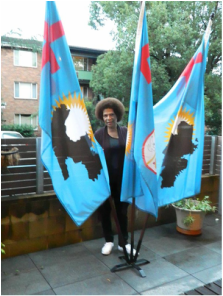
By Oni Kirwin
Our Right to Self –Determination:
The right to self-determination has been legally codified in the International Covenant on Civil and Political Rights (‘ICCPR’) and the International Covenant on Economic, Social and Cultural Rights (‘ICESR’). Both stipulate, under Article 1(1), that “All peoples have the right of self-determination.” By virtue of that right, we the Nadroga-Navosa and Ra peoples have together made a conscious decision to UNILATERALLY BREAKAWAY from the current oppressive and dictatorial government of Bainimarama and Khaiyum, following the rule in Kosovo, “the right to secede from an oppressive government.” In choosing to follow the precedent set by Kosovo, we accept the responsibility to “freely determine our political status and freely pursue our economic, social and cultural development” (ICCPR Article 1(1)).
Our right to self determination is asserted on the basis that we are ethnic peoples, first nation peoples of Fiji and therefore sovereign people of this land, owning all the lands and resources in this country and by law, able to utilise our group rights in pursuit of our basic right to life (Article 6 ICCPR) and to freedom (Part2 Article 2. 3(a) ICCPR) and pursue peace and prosperity for ourselves and for our generations to come.
The decision to unilaterally breakaway has been forced upon us by the oppressive, dictatorial and tyrannical nature of the Bainimarama/Khaiyum regime, which has been introduced into Fiji by statutory stealth under duress of the barrel of the gun. This regime is bent on a perverse form of social engineering which employs constitutionally enshrined laws of “mainstreaming” with which it enforces intensive assimilation that selects only the native Fijian race as its target group (Chapter 1 Section 1(a) and Section 5(1) (2)(a)). The objective of the regime is to turn native Fijian people into their nirvana concept of a polity of equality, whereby the state owns everything and all citizens of Fiji are robots, devoid of soul and humanity, unilaterally succumbing to the will of the state for the transformation of both, land and its people into their ultimate dream of a “modern-progressive-Fiji.”
This ideology has been tried and tested the world over, but failed miserably. One such experimentation involved the creation of a ‘super race’ conducted in Germany by Adolf Hitler in 1930s through to mid 1940s which saw six million Jews killed in gas chambers because they weren’t ‘super’ enough! In the Fijian experimentation, now constitutionally enshrined (Chapter 1 section 5) this mainstreaming of indigenous Fijians into a modern progressive Fiji, in essence amounts to extermination and genocide of the race intended to wipe us out from the landscape of Fiji, which we, Nadroga-Navosa and Ra peoples do not, and will not accept or tolerate.
In their mindless quest to disengage, disempower, dispossess and weaken the resolve of native Fijian people in Fiji, our country of origin, the Bainimaram/Khaiyum government, since their 2006 coup d’état have systematically dismantled all our native Fijian peak bodies and key institutions, and have reformulated to our disadvantage laws of financial institutions (Fijian Holdings and Fijian Trust Funds) and various codes of conduct that previously worked in our favour, have now been changed for the purpose of disinheriting our future generations.
We people of Nadroga-Navosa and Ra reject outright the 2013 Constitution which Khaiyum himself wrote without consulting the citizens of Fiji, or assembling a Constitutional Convention of Fiji’s citizen-stakeholders, or getting the views and submissions from the citizens of Fiji, or involving the citizens of Fiji in any part of its writing or in its ultimate endorsement and adoption. After all the Constitution is the supreme law of the people of the Land of Fiji, which should in principle enshrine the rights and responsibilities they pledge themselves to uphold and be bound by. Since none of the established guidelines were followed, we people of Nadroga-Navosa and Ra reject outright the 2013 Constitution as an imposition and a menace which we did not contribute to, in any way, manner or form.
To add salt to injury, the 2013 Constitution has enshrined ‘secularism’ against our will, ‘comparative religion’ against our will and the repugnant ‘mainstreaming’ laws which we talked about earlier, also against our will. We people of Nadroga-Navosa and Ra, claim to be devout and committed Christians and have been so since 1835, decades before colonisation arrived on our shores in 1874. Our express desire for Fiji to remain a Christian country is embedded in history.
In the Preamble of the 1874 Deed of Cession, which our paramount chief Ratu Kini was a signatory to stated their express desire for Fiji to remain a Christian country. This was later to be reaffirmed by our leaders in 1963 in their Wakaya Letter. of 17 January 1963:
“We also stand by the expressed desire of the high Chiefs in the preamble to the Deed of Cession that Fiji should be a Christian state and that, therefore, no constitutional or administrative changes should take place that would deviate from that intention.” Signed by KKT Mara, PK Ganilau, S Sikivou, R Vunivalu, GK Cakobau, AC Reid (Chairman), JN Falvey (Legal Adviser) and RM Major (Financial Adviser).
We have now fully articulated the basis upon which our conscious decision is predicated, to unilaterally breakaway from the Bainimaram/Khaiyum oppressive and dictatorial regime in order to form our autonomous Christian governments.
We reiterate that our right to self determination is clear in our minds. This right is enshrined in various United Nations conventions and is well established in international precedents and international case law. While Fiji has not ratified the United Nations Declaration on the Rights of Indigenous Peoples (UNDRIP 2007), we obviously have access to other international conventions such as ILO C169, ICCPR, ICESR and the Statutes of Genocide 1948 to name a few, that equally validate our indigenous peoples’ legal right to seek self-determination in the international arena, from the Bainimaram/Khaiyum regime hell-bent on exterminating and annihilating us from the landscape of Fiji, our country of origin.
In spite of arguments against these rights, they remain the legal instruments best suited to progress our indigenous peoples’ right to self-determination.
The right to self-determination of indigenous peoples under international law has been codified as customary international law under the Modern Custom theory. International Customary Law (ICL) is one of three main sources of law that the International Court of Justice (ICJ) derives its laws and verdicts from. The other two are the international conventions accepted by states as law and the general principles accepted by states as law. The ICJ’s Statute Article 38 classifies all three sources of law, so ICL is one of its main sources of law. and thus further validating this theory.
As regards the UNDRIP 2007 this was the first time in indigenous peoples’ legal history that their right to self-determination had been enshrined in a document that recognizes their legal rights under international law.
Under the modern custom theory, I will argue that human rights principles enshrined into UN Declarations or Resolutions can be crystallized into ICL. This is based on the strong opinio juris and the strong moral content (Lex ferenda) of the document being passed through the General Assembly. To support this belief this I will provide four case studies that show a strong opinio juris of state compliance with the right to self-determination of indigenous peoples from both regional human right bodies and national state legislation to the Human Rights Council.
Our Right to Self –Determination:
The right to self-determination has been legally codified in the International Covenant on Civil and Political Rights (‘ICCPR’) and the International Covenant on Economic, Social and Cultural Rights (‘ICESR’). Both stipulate, under Article 1(1), that “All peoples have the right of self-determination.” By virtue of that right, we the Nadroga-Navosa and Ra peoples have together made a conscious decision to UNILATERALLY BREAKAWAY from the current oppressive and dictatorial government of Bainimarama and Khaiyum, following the rule in Kosovo, “the right to secede from an oppressive government.” In choosing to follow the precedent set by Kosovo, we accept the responsibility to “freely determine our political status and freely pursue our economic, social and cultural development” (ICCPR Article 1(1)).
Our right to self determination is asserted on the basis that we are ethnic peoples, first nation peoples of Fiji and therefore sovereign people of this land, owning all the lands and resources in this country and by law, able to utilise our group rights in pursuit of our basic right to life (Article 6 ICCPR) and to freedom (Part2 Article 2. 3(a) ICCPR) and pursue peace and prosperity for ourselves and for our generations to come.
The decision to unilaterally breakaway has been forced upon us by the oppressive, dictatorial and tyrannical nature of the Bainimarama/Khaiyum regime, which has been introduced into Fiji by statutory stealth under duress of the barrel of the gun. This regime is bent on a perverse form of social engineering which employs constitutionally enshrined laws of “mainstreaming” with which it enforces intensive assimilation that selects only the native Fijian race as its target group (Chapter 1 Section 1(a) and Section 5(1) (2)(a)). The objective of the regime is to turn native Fijian people into their nirvana concept of a polity of equality, whereby the state owns everything and all citizens of Fiji are robots, devoid of soul and humanity, unilaterally succumbing to the will of the state for the transformation of both, land and its people into their ultimate dream of a “modern-progressive-Fiji.”
This ideology has been tried and tested the world over, but failed miserably. One such experimentation involved the creation of a ‘super race’ conducted in Germany by Adolf Hitler in 1930s through to mid 1940s which saw six million Jews killed in gas chambers because they weren’t ‘super’ enough! In the Fijian experimentation, now constitutionally enshrined (Chapter 1 section 5) this mainstreaming of indigenous Fijians into a modern progressive Fiji, in essence amounts to extermination and genocide of the race intended to wipe us out from the landscape of Fiji, which we, Nadroga-Navosa and Ra peoples do not, and will not accept or tolerate.
In their mindless quest to disengage, disempower, dispossess and weaken the resolve of native Fijian people in Fiji, our country of origin, the Bainimaram/Khaiyum government, since their 2006 coup d’état have systematically dismantled all our native Fijian peak bodies and key institutions, and have reformulated to our disadvantage laws of financial institutions (Fijian Holdings and Fijian Trust Funds) and various codes of conduct that previously worked in our favour, have now been changed for the purpose of disinheriting our future generations.
We people of Nadroga-Navosa and Ra reject outright the 2013 Constitution which Khaiyum himself wrote without consulting the citizens of Fiji, or assembling a Constitutional Convention of Fiji’s citizen-stakeholders, or getting the views and submissions from the citizens of Fiji, or involving the citizens of Fiji in any part of its writing or in its ultimate endorsement and adoption. After all the Constitution is the supreme law of the people of the Land of Fiji, which should in principle enshrine the rights and responsibilities they pledge themselves to uphold and be bound by. Since none of the established guidelines were followed, we people of Nadroga-Navosa and Ra reject outright the 2013 Constitution as an imposition and a menace which we did not contribute to, in any way, manner or form.
To add salt to injury, the 2013 Constitution has enshrined ‘secularism’ against our will, ‘comparative religion’ against our will and the repugnant ‘mainstreaming’ laws which we talked about earlier, also against our will. We people of Nadroga-Navosa and Ra, claim to be devout and committed Christians and have been so since 1835, decades before colonisation arrived on our shores in 1874. Our express desire for Fiji to remain a Christian country is embedded in history.
In the Preamble of the 1874 Deed of Cession, which our paramount chief Ratu Kini was a signatory to stated their express desire for Fiji to remain a Christian country. This was later to be reaffirmed by our leaders in 1963 in their Wakaya Letter. of 17 January 1963:
“We also stand by the expressed desire of the high Chiefs in the preamble to the Deed of Cession that Fiji should be a Christian state and that, therefore, no constitutional or administrative changes should take place that would deviate from that intention.” Signed by KKT Mara, PK Ganilau, S Sikivou, R Vunivalu, GK Cakobau, AC Reid (Chairman), JN Falvey (Legal Adviser) and RM Major (Financial Adviser).
We have now fully articulated the basis upon which our conscious decision is predicated, to unilaterally breakaway from the Bainimaram/Khaiyum oppressive and dictatorial regime in order to form our autonomous Christian governments.
We reiterate that our right to self determination is clear in our minds. This right is enshrined in various United Nations conventions and is well established in international precedents and international case law. While Fiji has not ratified the United Nations Declaration on the Rights of Indigenous Peoples (UNDRIP 2007), we obviously have access to other international conventions such as ILO C169, ICCPR, ICESR and the Statutes of Genocide 1948 to name a few, that equally validate our indigenous peoples’ legal right to seek self-determination in the international arena, from the Bainimaram/Khaiyum regime hell-bent on exterminating and annihilating us from the landscape of Fiji, our country of origin.
In spite of arguments against these rights, they remain the legal instruments best suited to progress our indigenous peoples’ right to self-determination.
The right to self-determination of indigenous peoples under international law has been codified as customary international law under the Modern Custom theory. International Customary Law (ICL) is one of three main sources of law that the International Court of Justice (ICJ) derives its laws and verdicts from. The other two are the international conventions accepted by states as law and the general principles accepted by states as law. The ICJ’s Statute Article 38 classifies all three sources of law, so ICL is one of its main sources of law. and thus further validating this theory.
As regards the UNDRIP 2007 this was the first time in indigenous peoples’ legal history that their right to self-determination had been enshrined in a document that recognizes their legal rights under international law.
Under the modern custom theory, I will argue that human rights principles enshrined into UN Declarations or Resolutions can be crystallized into ICL. This is based on the strong opinio juris and the strong moral content (Lex ferenda) of the document being passed through the General Assembly. To support this belief this I will provide four case studies that show a strong opinio juris of state compliance with the right to self-determination of indigenous peoples from both regional human right bodies and national state legislation to the Human Rights Council.

